 Petzlover
PetzloverCao de Fila da Terceira is originated from Portugal but Gull Terr is originated from Pakistan. Cao de Fila da Terceira may grow 9 cm / 3 inches shorter than Gull Terr. Cao de Fila da Terceira may weigh 35 kg / 78 pounds more than Gull Terr. Both Cao de Fila da Terceira and Gull Terr has same life span. Both Cao de Fila da Terceira and Gull Terr has same litter size. Both Cao de Fila da Terceira and Gull Terr requires Low Maintenance.
The Cao de Fila da Terceira Mastiff hails from Portugal and is also known as the Rabo Torto.The dog actually comes from the isle of Terceira in the Azores. The dog descends from mastiffs, bulldogs and local dogs.
It was in the 1960s that there was an attempt to revive the dwindling numbers of the breed. The dog was declared extinct in the 1970s but there were some people in the Azores who wanted to see the breed restored, and it remains a mystery as to if the dog is in fact still available. The breed isn’t recognized by kennel clubs.
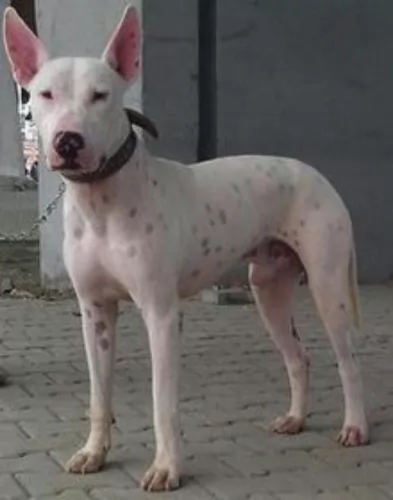 The Gull Terr hails from Pakistan. Having been introduced to the country by the British Raj, the dog has always been valued for its guarding and fighting abilities.
The Gull Terr hails from Pakistan. Having been introduced to the country by the British Raj, the dog has always been valued for its guarding and fighting abilities.
The British army, on bringing English Bull Terriers with them, mated them with local dogs. The dog was in other words, created from the old bull terrier which became extinct, and the Bully Kutta.
The Gull Terr or Pakistani Bull Terrier as he is known is a rare breed of dog. Today they are usually found in rural areas of Pakistan as well as in the Indian Panjab area, becoming popular as both pet and watchdog. It is no longer used for dog fighting as this has been banned.
The Cao de Fila da Terceira is a medium sized molosser, recognized by his weird tail – short and twirled. In fact, the dog’s other name, Rabo Torto, actually stands for ‘twisted tail’, which is a trademark of this dog and which is thought to come from the mix of bulldog in him.
The dog’s coat is short and smooth and the color is usually fawn or yellow while other colors such as brindle, red or black are also available but less acceptable. You may also find small white markings on the chest and feet.
Standing at about 55cm, the dog is muscular and powerful with a broad head, medium sized floppy ears, wide chest and strong muzzle.
The Cao de Fila da Terceira is a good guard dog and while he doesn’t like strangers, he is a dog who is loving and devoted with his human family. See that he gets socialized and trained and he is capable of establishing a deep relationship with all members of the family, children and other pets included. He relies on his owners to provide him with warmth and communication.
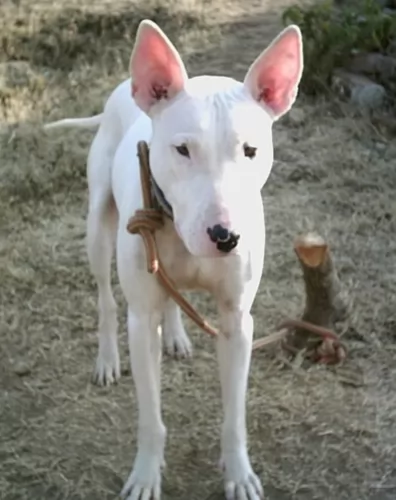 As a medium sized dog, the muscled Gull Terr stands as 45 – 66cm in height and weighs in the area of 40 – 45kg.
As a medium sized dog, the muscled Gull Terr stands as 45 – 66cm in height and weighs in the area of 40 – 45kg.
The dog has a short, smooth coat which is white, but you may find some black spots on him. He has a egg shaped head, ears are naturally erect, dark slanted eyes, and he has a long tail which is held upwards. Muscled and agile, he is a powerful working breed and makes a good watchdog.
This is an aggressive dog breed, and first-time dog owners might want to have a more amicable kind of pet to start off with.
He is a fearless dog, somewhat aggressive and suspicious towards strangers and therefore wants to protect his owner from them. With training and socialization he can be good with children in the home, although he is inclined to be boisterous and stubborn. He has fierce protective instincts, even though he is considered not as aggressive as some other Pakistani dog breeds.
The Gull Terr will need an experienced dog handler. Even though he has been a fighter in his day, he is capable of being an excellent family pet as well. You won't have trouble training him as he is intelligent. He then becomes more obedient and more manageable. He is a very active dog and therefore he won't fit into city dwelling where there are small spaces. He needs a place to run and on top of that he will require a good deal of exercise.
If only dog owners would realize that when it comes to a dog’s characteristics, that while there are some traits inherent in a dog, essentially it’s a case of you reap what you sow with a dog. Treat your dog badly, ignore him and abuse him and you get an aggressive, volatile dog who is a threat to the very humans who created the monster in him.
The Cão de Fila da Terceira will certainly need excellent training and socialization, and when he receives plenty of loving attention from his human family he becomes an amazing, relaxed pet. He becomes patient and sweet-tempered so that you can ultimately call him guardian and friend.
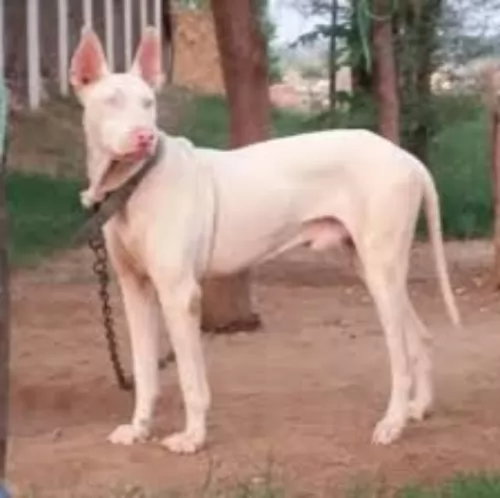 Your Gull Terr love the attention he receives from his human family and he won’t flourish at all if he is put into the back yard for watch dog purposes only. He is a dog that needs to come indoors to be with his family.
Your Gull Terr love the attention he receives from his human family and he won’t flourish at all if he is put into the back yard for watch dog purposes only. He is a dog that needs to come indoors to be with his family.
He tends to be somewhat aggressive and this is why he isn’t looked upon as the ideal pet for first-time dog owners and those with young children in the home.
He is a confrontational dog, willing to enter into a fight with provocation. Strong willed he will require early training and socialization, and when he is brought up by a firm, consistent, kind owner, he can get over his aggression and become a loyal, devoted, protective and loving pet.
The Cão de Fila da Terceira is a healthy dog breed, but even so, you need to be looking out for some ailments which can threaten the comfort and wellbeing of any dog.
This can often be brought about by the wrong diet. When you see your pet battling to clear out the bowels, it can often be rectified by altering your dog’s diet. Speak to your vet if it continues. Your vet may suggest adding some form of nutritious oil to your pet’s diet.
Dogs can also suffer from heart disease, especially when there is an obstruction to the flow of blood to the brain which can cause your pet to collapse. Veterinary attention must be sought without delay.
Frequent passing of water can be indicative of a kidney problem. Veterinary advice will be needed.
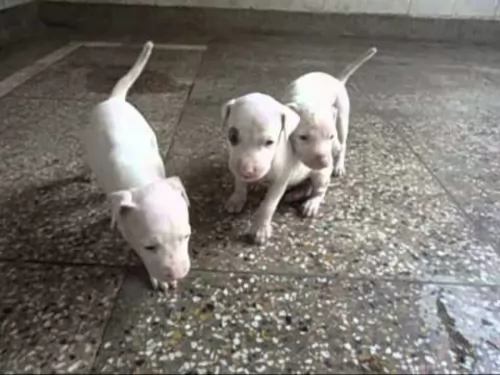 The Gull Terr has a deep chest and this means he is more prone to bloat, a condition known as gastric dilation volvulus.
The Gull Terr has a deep chest and this means he is more prone to bloat, a condition known as gastric dilation volvulus.
Your pet's stomach fills with air and this leads to decreased blood flow to vital organs. The stomach can twist and this is when the condition becomes life threatening as blood supply to the stomach is cut off. Instead of feeding him large meals, feed him smaller meals more frequently.
Deafness in your pet can be temporary or permanent, in one ear or both. There are are so many reasons why your pet could be deaf and it could be a birth defect, an infection or old age. Certain dogs such as the white coated Gull Terr are also more predisposed to congenital deafness.
Get him to the vet who will examine your dog’s ear canal for wax and debris and discuss the way to go for your beloved pet.
Companionship is important for the Cao de Fila da Terceira, and if you don’t have another dog in the home, as a pack animal, your dog will rely on you for being an active part of his life. A dog that is well treated becomes thoroughly loyal to his owner.
A balanced diet is important for health and for a shiny coat. If you’re unsure of how to feed your Terceira, speak to your veterinarian first. Your vet will know that protein for instance, is essential for your dog. The vet will also speak to you about how to feed a puppy, an adult dog, a pregnant female dog and also feeding your senior dog. Your vet will also explain the hazards of overfeeding and how raw meat also needs to be included in your pet’s diet.
Fresh, cool water is your pet’s life-blood and should be available to your dog night and day. Every dog can benefit too from taking a daily supplement rich in omega-3 fatty acid.
The grooming of your pet will depend on the breed. The Cão de Fila da Terceira has a short coat so he will be easy to maintain. Brush him twice a week to remove loose hairs.
Areas which also need checking daily are the eyes to see that there is no discharge. It is also important to inspect the ears as there should be no build-up of wax inside the ear. Toenails also need attention and should be clipped if they grow long from the pet not walking on hard surfaces.
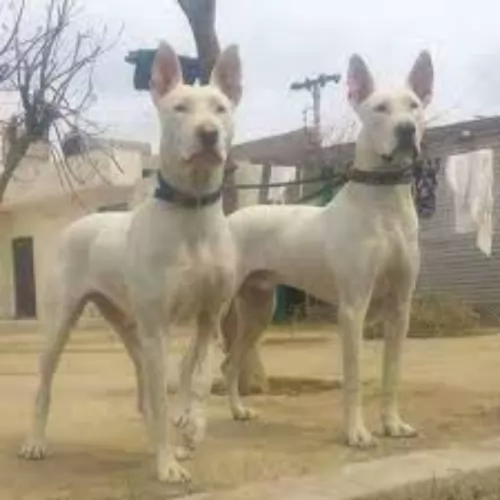 Easy to look after with his short coat, the Gull Terr will only require a brushing twice a week to keep the coat shiny and healthy.
Easy to look after with his short coat, the Gull Terr will only require a brushing twice a week to keep the coat shiny and healthy.
Because his coat is white, it can show dirt easily, and it will simply require taking a damp cloth and wiping the mark off him. You don't want to be bathing him often as this dries his skin out – rather just wipe the coat down.
Your Gull Terr is a highly energetic dog and he loves nothing more than to be involved in robust exercise and games. He is best suited in a home with large grounds and if you do opt to have him in the city, you will have to pay close attention to his exercise needs – lots of walks, runs, ball games, swimming and running with you as you cycle.
You want to be sure that your energetic Gull Terr has a healthy diet full of important proteins, fats, and carbohydrates.
Protein is always important for a dog like this and you want to make absolutely sure that apart from his high quality kibble, you mix in raw meat from time to time as well as cooked chicken, fish, brown rice and vegetables.
When looking for a commercially manufactured dog food, look for high-quality animal protein as a top ingredient. Make sure he always has fresh, cool water available to him.